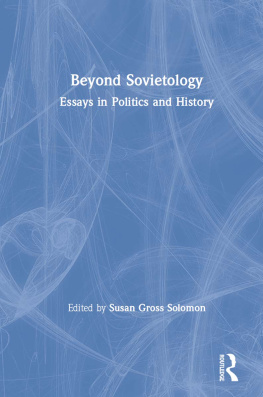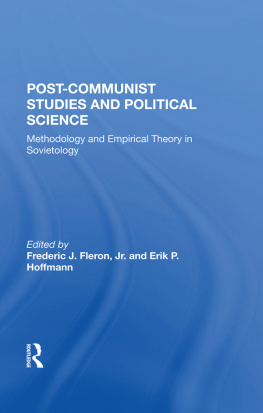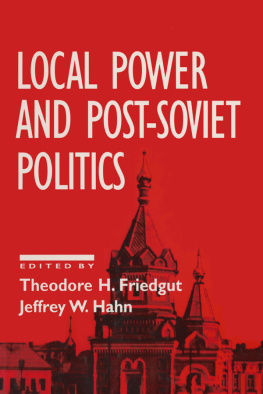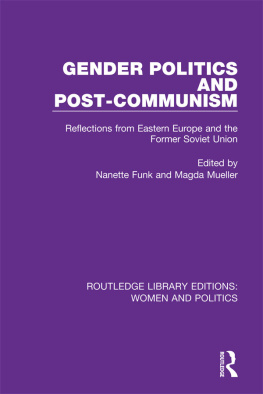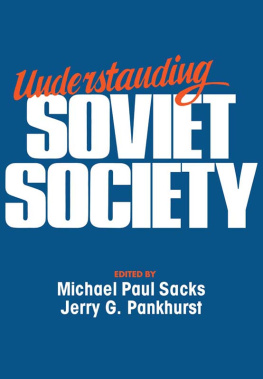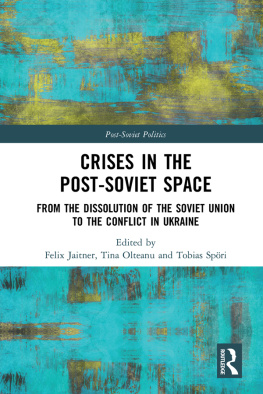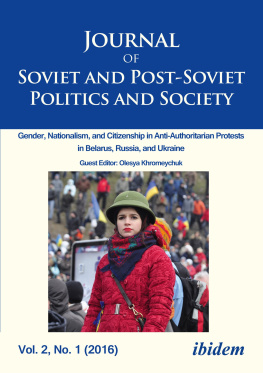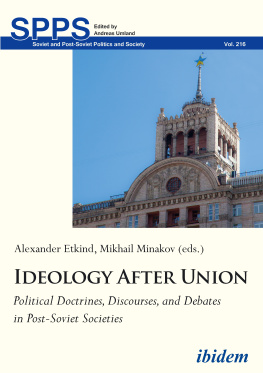BEYOND SOVIETOLOGY
Contemporary Soviet/Post-Soviet Politics
PERESTROIKA-ERA POLITICS
THE NEW SOVIET LEGISLATURE
AND GORBACHEVS POLITICAL REFORMS
Robert T. Huber and Donald R. Kelley, editors
SOVIET CONSTITUTIONAL CRISIS
FROM DE-STALINIZATION TO DISINTEGRATION
Robert Sharlet
EXECUTIVE POWER AND SOVIET POLITICS
THE RISE AND FALL OF THE SOVIET STATE
Eugene Huskey, editor
CRACKS IN THE MONOLITH
PARTY POWER IN THE BREZHNEV ERA
James R. Millar, editor
CRIME AND PUNISHMENT IN SOVIET OFFICIALDOM
COMBATING CORRUPTION IN THE SOVIET ELITE, 19651990
William Clark
BEYOND SOVIETOLOGY
ESSAYS IN POLITICS AND HISTORY
Susan Gross Solomon, editor
First published 1993 by M.E. Sharpe
Published 2015 by Routledge
2 Park Square, Milton Park, Abingdon, Oxon OX14 4RN
711 Third Avenue, New York, NY 10017, USA
Routledge is an imprint of the Taylor & Francis Group, an informa business
Copyright 1993 Taylor & Francis. All rights reserved.
No part of this book may be reprinted or reproduced or utilised in any form or by any electronic, mechanical, or other means, now known or hereafter invented, including photocopying and recording, or in any information storage or retrieval system, without permission in writing from the publishers.
Notices
No responsibility is assumed by the publisher for any injury and/or damage to persons or property as a matter of products liability, negligence or otherwise, or from any use of operation of any methods, products, instructions or ideas contained in the material herein.
Practitioners and researchers must always rely on their own experience and knowledge in evaluating and using any information, methods, compounds, or experiments described herein. In using such information or methods they should be mindful of their own safety and the safety of others, including parties for whom they have a professional responsibility.
Product or corporate names may be trademarks or registered trademarks, and are used only for identification and explanation without intent to infringe.
Library of Congress Cataloging-in-Publication Data
Beyond Sovietology : Essays in politics and history / edited by Susan Gross Solomon
p. cm.(Contemporary Soviet/post-Soviet politics)
Includes index.
ISBN 1-56324-221-4. 1.
1. Soviet UnionSocial conditions1970-1991.
2.Soviet UnionPolitics and government1985-1991.
3. Soviet UnionStudy and teaching.
I. Solomon, Susan Gross.
II. Series.
HN523.5.B471993
306.0947dc20
92-22211
CIP
ISBN 13: 9781563242212 (hbk)
This collection of essays had a serendipitous beginning. In the mid-1980s, the Joint Committee on Soviet Studies (JCSS) of the Social Science Research Council and the American Council of Learned Societies became concerned about the fact that few young students were specializing in internal Soviet politics and policy, and--even more alarming--few were staying in the specialty. At the very time when remarkable political developments in the Soviet Union itself were calling into question fundamental assumptions about the operation of Soviet domestic politics and society, the supply of young political scientists qualified to interpret those changes was dwindling. To reverse this trend, the Sub-Committee on Soviet Domestic Politics of the JCSS endorsed the holding of a series of workshops that would bring together for two-week periods faculty and pre-and post-doctoral students working in the field.
The First Workshop on Soviet Domestic Politics and Society was held in Toronto in June of 1987, administered by the Social Science Research Council and funded by the Carnegie Corporation. The intellectual freshness and excitement of the twenty young participants who had gathered to argue about the substance and method of studying Russian politics in the midst of a Toronto heat wave was contagious. The Second Workshop, held a year later, made it clear this was not a chance phenomenon: there was something qualitatively different about the way in which this generation of young scholars was posing questions, applying theories, positing hypotheses and exploiting newly-available sources of data. At that point, Dr. Robert Huber, then Staff Associate of the Social Science Research Council with special responsibility for the operation the Joint Committee, proposed the publication of a volume of papers from the Workshops.
The present collection, drawn from presentations made at the first four Workshops, derives from Hubers suggestion. Selecting the contributions for the volume was no easy matter. The number of first-rate papers presented to the Workshops over a four-year period exceeded by many times the number of contributions included here. The commitment to getting the work of this new cohort of specialists into print with the least possible delay meant, however, that exciting research that was at a preliminary stage could not be included.
In the course of preparing this volume, I have accumulated a number of debts which I take great pleasure in acknowledging here. In the first instance, thanks are due to those institutions and individuals without whom the Workshops would not have taken place: the Social Science Research Council, and especially Dr. Robert Huber and his predecessor at the Council, Dr. Blair Ruble, for their unflagging endorsement of the enterprise; the Carnegie Corporation for understanding the importance of the effort to revitalize the field of Soviet domestic politics in North America through the nurturing of a new cohort of scholars; the University of Toronto, and especially Massey College, for its hospitality to five successive years of enthusiasts given to arguing about Russian politics long into the night; and the Centre for Russian and East European Studies of the University of Toronto--and in particular William Guest and Jana Oldfield--for assistance in preparing the Workshops and in ministering to the needs of participants while the Workshops were in progress.
The actual preparation of the essays generated a separate series of debts. First of all, we are grateful to the Social Science Research Council, which provided funding for the publication. I would also like to thank my Co-directors, Thane Gustafson and Peter Solomon, for their wise counsel in selecting the contributions; Pat Kolb of M.E. Sharpe for her forbearance with an editor who changed the title of the volume three times; the contributors who bore with amazing good humor what must have seemed like the unremitting demands of an editor for changes or clarifications. Last, but by no means least, I am grateful to Dr. Edith Klein of the Centre for Russian and East European Studies, University of Toronto, for the caring spirit in which she joined me in editing the manuscript and for her dogged persistence in mastering the technology required to convert red-pencilled flat copy to aesthetic camera-ready copy.

